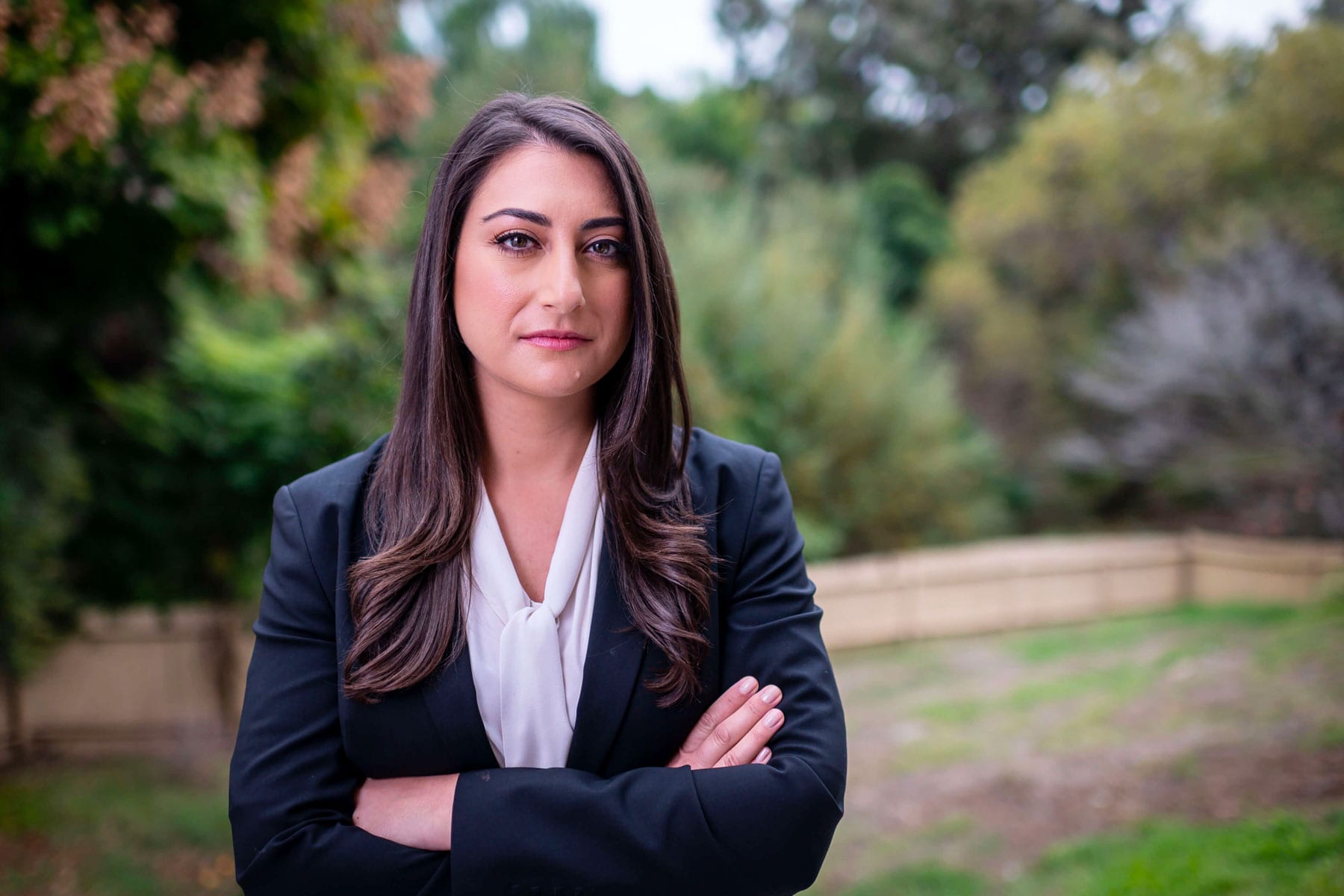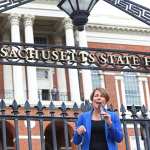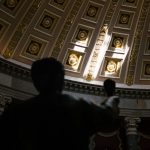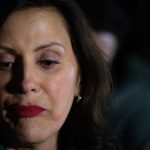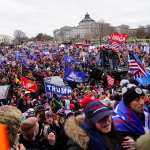The 19th will be watching the impeachment trial. Sign up for our daily newsletter to receive updates on the latest from Capitol Hill.
On her fourth day on the job, Rep. Sara Jacobs, a Democrat from San Diego’s east side, was in the House of Representatives gallery when a violent mob stormed the Capitol.
Once lawmakers were told they could leave the gallery, she headed through the labyrinthine Capitol complex to her office, where she had a glass of whiskey with neighboring Rep. Jason Crow of Colorado and decided that those responsible for the insurrection should be held accountable — including outgoing President Donald Trump.
Before running for her House seat, Jacobs, 32, was a policy adviser at the United Nations, UNICEF and to Hillary Clinton during her 2016 presidential campaign. At former President Barack Obama’s State Department, Jacobs studied new ways to prevent and counter violent extremism overseas. But it was as a brand-new member of Congress that she faced her most direct threat.
“My poor parents thought that as soon as I was done traveling around the world to some of these hard places that they could finally sleep easier at night only for the House chamber to be the most dangerous place I could be,” Jacobs said.
Jacobs sat down with The 19th to discuss the January 6 riot at the Capitol, the role that the far-right QAnon conspiracy and white supremacy played in the attack, and what the country’s next steps should be.
This interview has been edited for length and clarity.
You have traveled extensively overseas, including in areas of conflict, where violent extremists are at work. Where were you during the Capitol riot on January 6 and what were you thinking?
I was in the House gallery with a number of other members of Congress. I will say, probably the scariest part for me was, it was my first week, and I just remember thinking to myself: I don’t know how to get out, I don’t know my way around yet. I usually always had an evacuation plan and had the security training, I just felt that I didn’t even know what I was supposed to be doing, because I was so new.
You were at the State Department during the Obama administration, focused on countering and preventing violent extremism. What was the scope of your work there and what did you learn?
When I was at the State Department in the Bureau of Conflict and Stabilization Operations, President Obama created a whole new initiative around countering and preventing violent extremism, and I led our bureau’s work on that, particularly looking at what can we really learn from empirical research about the real drivers of violent extremism, and, therefore, what the best programmatic responses could be. [We] created a research network at the U.S. Institute of Peace with some of our other bureaus that still exists today, the RESOLVE research network, to really figure out how we can actually better use local researchers as we’re looking at those questions. And then [we] created an analysis framework of what the empirical research tells us are the main drivers of people, individuals being recruited into violent extremism, but also communities who are more susceptible to violent extremism and communities who are more resilient to violent extremism, and then work directly on countering and preventing violent extremism in Nigeria, during the height of the Boko Haram fight, and then in East Africa.
What are some of the drivers that you saw in the regions you studied?
It actually has no correlation to poverty, no correlation to a general attitude of hatred towards the West. Really, some of the main drivers are a threat to your sense of identity. So if you believe that there’s some external threat coming in, that’s going to change you, your group. Or if you have, yourself or someone you know, experienced violence at the hands of the state; if you have a hardened attitude about others, or a lack of critical thinking skills; and places that have curtailed civil liberties.
After you came up with that framework to figure out the drivers, did your research get into what to do to curtail the spread of extremism and the adoption of it within specific communities?
I should also say that another big factor in violent extremism is common social networks. You often see that it really is more of a social engagement, why people end up joining these groups. You also see upticks in violence — not necessarily on extremism, per se, but violence — when you have new communication techniques. So you saw with the genocide in Rwanda, radio played a huge role. We saw with the genocide against the Rohingya [in Myanmar], where Facebook was an important driver of that. And I think we see social media being an very, very important driver of the spread of the QAnon conspiracy and other violent ideologies here in the United States. But really looking more broadly at: When you have societies that are more susceptible, how you can make sure you have institutions that are able to absorb the conflict that every society has?
You mentioned QAnon here in the United States. When did you first learn about it as a domestic threat and what are the parallels to movements such as Boko Haram you studied in Nigeria?
I became aware of QAnon maybe a year or two ago. Unfortunately, in San Diego, which I represent, we actually have quite a lot of groups who engage in some of this. And the woman who was shot [and killed at the Capitol], Ashli Babbitt, is actually from San Diego. I actually learned about it first from an Uber driver of mine who was a believer. I think part of what is important as we look at QAnon is actually separating out the silly from the real. We see in a lot of cases around the world, and also what we see here, you have the sort of mass consumption of conspiracy theories that creates space for the more organized violent actors, but it’s not necessarily the same as the more organized violent actors. And that, I think, is something we should keep in mind as we’re thinking about the threat of QAnon, that not everyone who believes in QAnon themselves are part of the more violent strain. But it creates that space for that more organized group to be able to operate and look almost silly, because so much of what you would see about QAnon feels so outlandish.
What could be done about it? Are there any concrete steps that we could take as a country to start addressing this? This is, as you know, pretty off-the-wall stuff in some cases. And so how can we start to make inroads into educating people about what information they’re consuming?
There are a few components to what we need to do. So the first is, we do need to address the education component, making sure that we’re actually teaching critical thinking skills in schools. For a long time, our education system was more about memorizing or getting information, and now you can find information very readily. So how do you interpret and analyze that information and make that switch in our education? That, I think, will be very important to this.
The second is social media and the way that these conspiracy theories are spread. It’s not only the direct conversation around content and moderation that we know is long overdue, and we’ve seen a lot more discussion of, but also really thinking about the social media ecosystem itself, which prioritizes and incentivizes the information that generates the most reaction, which in most cases, is the most extreme. There have been some studies, you start at YouTube on any topic, and if you let it autoplay, by the seventh one, you’re on something extreme. So really figuring out what kinds of rules we need to create so that our social media landscape is creating the kind of society we want to live in and not incentivizing this kind of extreme ideology. There really is a need to address the lack of faith in institutions and leaders and government that is an enabling environment for something like the QAnon conspiracy to spread. I don’t think it’s an accident that so much of this has spread during the global pandemic that the United States government has failed to contain. Because that has helped people believe that so much else of what the government and institutions are doing are not actually looking out for them.
Lastly, we can’t ignore the role that racism and white supremacy plays in all of this. In a lot of countries, we see that these things often break down along ethnic cleavages. What I think we need to do is really have the real kind of reckoning that our country has never had on our racial history.
I think we need a truth commission. I think we need some of these best practices for transitional justice that we see overseas. And we need to make sure that we are not letting that racial and economic inequality be papered over as we do the rest of this rebuilding and healing.
What would a truth commission look like?
We have examples from a lot of places. The one that I think for most people comes to mind is the South African Truth and Reconciliation Commission. I think, personally, it should start at the very local level, with in-depth conversations between people who have committed harms against each other, and then broaden out to kind of a national conversation that really reckons with both the gory and the glory of our history and is able to find a common narrative on what our country can be moving forward.
You’ll be serving on the House Foreign Affairs and Armed Services Committees. Do you anticipate domestic extremism to be one of the issues you’re grappling with?
I am on the subcommittee on military personnel. I think addressing the fact that recent reports show that one in five people who took part in the insurrection had some ties to the military is going to be a big focus of mine, especially coming from the very proud military community of San Diego, where I’ve heard from so many constituents that the idea that so many folks associated with the military were part of this feels like it’s dishonoring their service. It’s really our veterans and service members themselves who have been asking me to focus on this. I wrote a letter with Congressman [Ruben] Gallego [of Arizona], shortly after the attack on the 6th, asking the at the time acting secretary of defense to look into holding accountable anyone within the military, or former military that could be held to the [Uniform Code of Military Justice].
